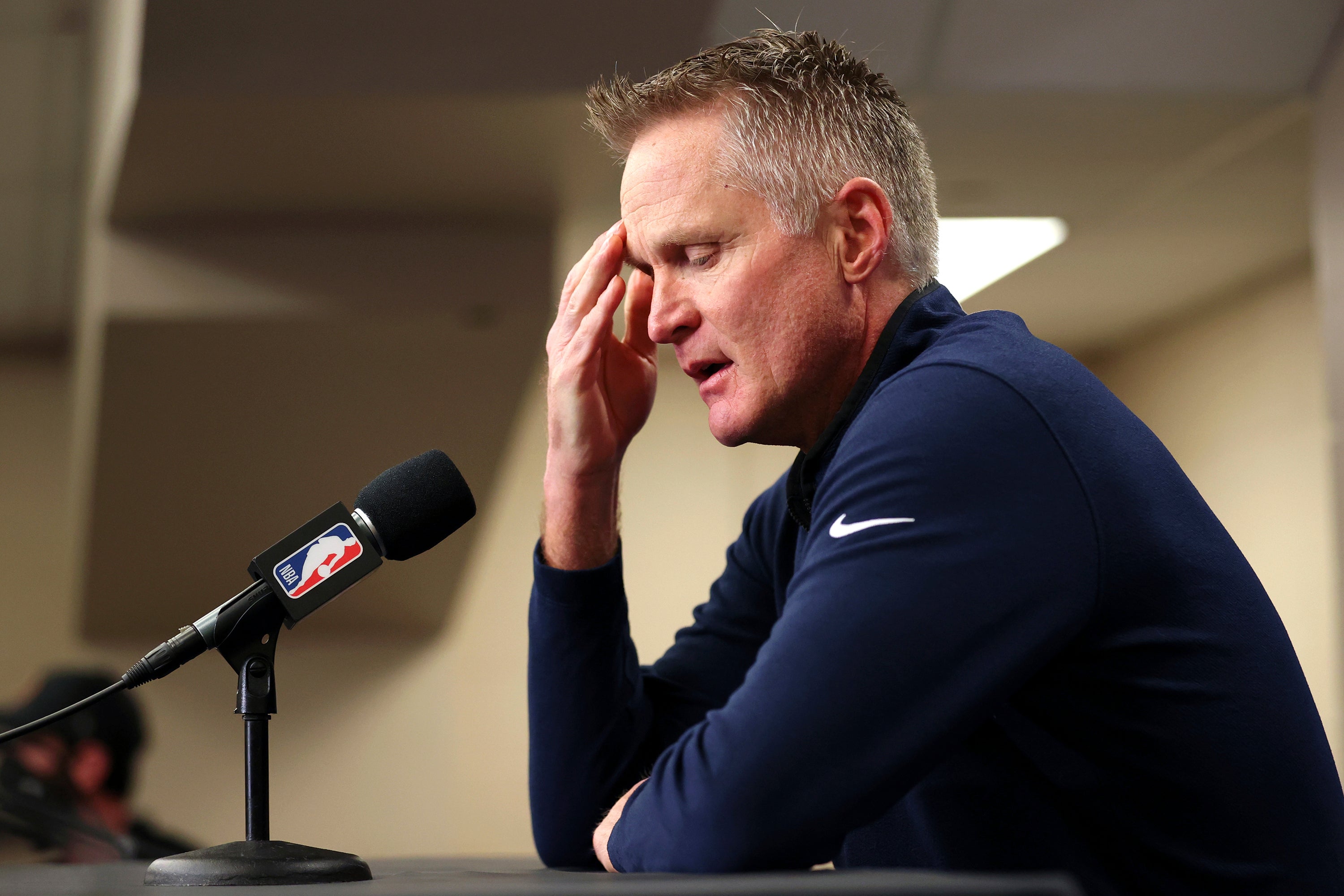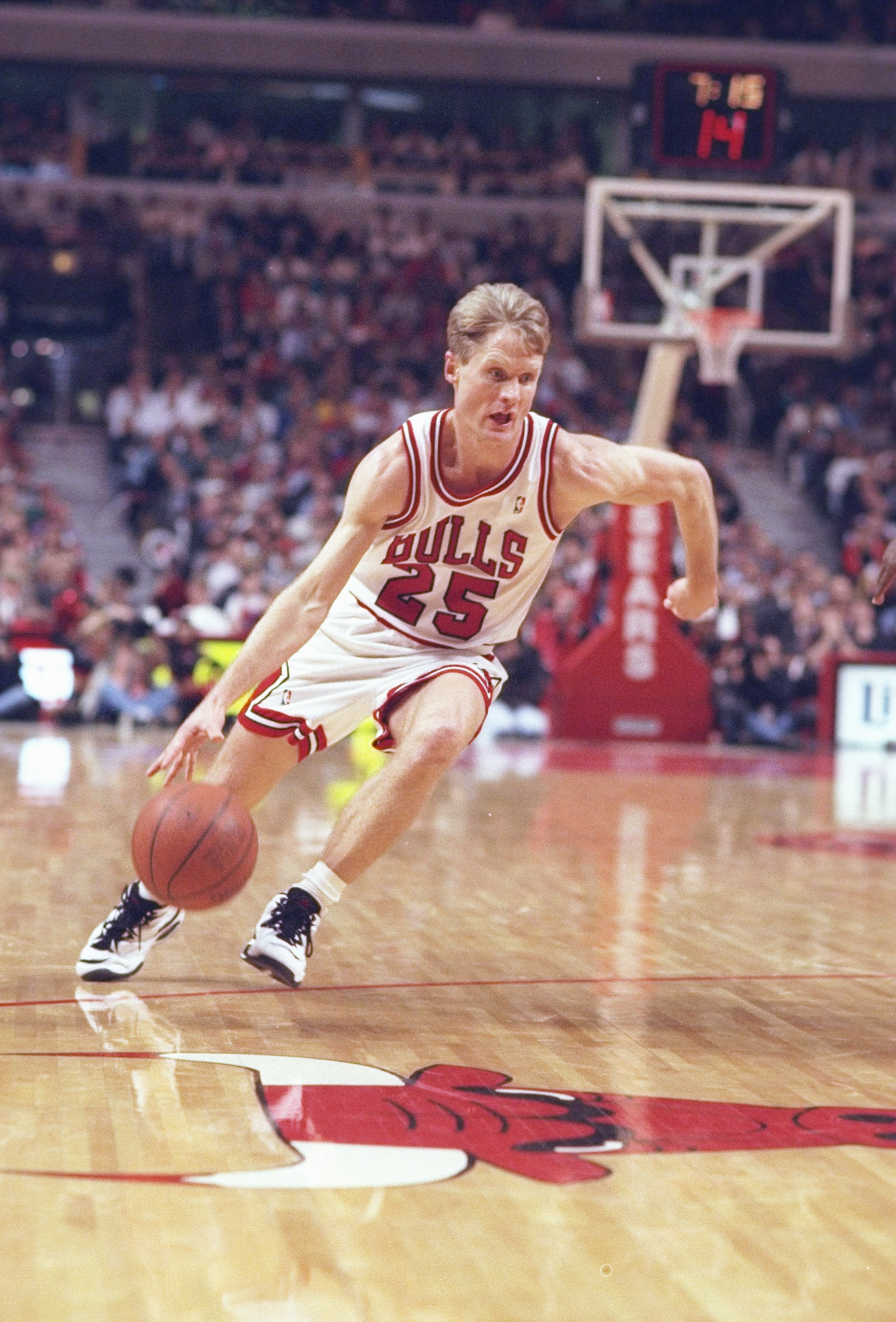Steve Kerr, an NBA great as player and coach, fuelled by his father’s death
The 56-year-old former Chicago Bull and current coach of Golden State Warriors is hugely respected across basketball, having followed his dream after his father was killed in a terrorist attack

Your support helps us to tell the story
This election is still a dead heat, according to most polls. In a fight with such wafer-thin margins, we need reporters on the ground talking to the people Trump and Harris are courting. Your support allows us to keep sending journalists to the story.
The Independent is trusted by 27 million Americans from across the entire political spectrum every month. Unlike many other quality news outlets, we choose not to lock you out of our reporting and analysis with paywalls. But quality journalism must still be paid for.
Help us keep bring these critical stories to light. Your support makes all the difference.
“I received a phone call in the middle of the night from a family friend,” Steve Kerr tells The Last Dance, a Netflix documentary which recounts the compelling story of his legendary Chicago Bulls team during the 1990s.
Kerr is remembering 19 January 1984, and the moment he found out his father had been assassinated in a targeted terrorist attack in Lebanon. The 18-year-old was attending the University of Arizona at the time while his father was working as president of the American University of Beirut. Malcolm Kerr, whose predecessor had been kidnapped six months earlier, was shot in the back of the head by Shia militia in the hallway outside his office.
“My phone rang in my dorm at 3 o’clock in the morning, so I knew something was up. He just said, ‘Steve, I have terrible news’. So… yeah…”
Kerr was born in Beirut and attended school both there and in Cairo before moving to Los Angeles as a teenager. He graduated in 1983, and just few months later his father was killed.
It sparked a fire in the unassuming teenager and drove his ambition to play professional basketball. Before a university game four years later, Kerr was abused by rival fans of Arizona State who chanted “PLO” (the Palestine Liberation Organisation, linked to Malcolm’s death) and “where’s your father?”. Kerr fought back the tears but didn’t react, and instead produced one of his best performances, making six out of six three-pointers in a relentless first half and leading his team to victory.
He was drafted to the NBA’s Phoenix Suns later that year, and went on to play for the Cleveland Cavaliers and Orlando Magic before earning a move to the Chicago Bulls and becoming part of their astonishing era of success, inspired by the talent of Michael Jordan and driven by his unparalleled will to win.
Kerr talked in The Last Dance about how he eventually won Jordan’s respect when he snapped in a tetchy training session and punched his teammate in the chest. Astonished that someone had stood up to him, the imposing Jordan clopped Kerr straight back in the eye, and their relationship went from strength to strength from that day on.
Kerr won three NBA championship rings with the Bulls. His humility shone through in the documentary as he hailed the influence of his teammates, and he later admitted feeling “embarrassed” that he got so much airtime in the series ahead of other, more important players.

However, his role as three-point sharpshooter was pivotal. His most famous moment came in the 1997 NBA Finals, at the end of Game 6 of the seven-game series against fierce rivals Utah Jazz. Jordan’s sheer aura drew opponents towards him as he faked the winning shot, before throwing a surprise pass to Kerr waiting in space who hit the winner himself.
Kerr’s dry sense of humour emerged in the aftermath of that triumph. He took the stage to give a speech at the Bulls’ celebration parade and joked: “There’s been some misconceptions about what really happened. Phil [Bulls coach Phil Jackson] told Michael ‘I want you to take the last shot’ and Michael said ‘you know Phil, I don’t feel real comfortable in these situations so maybe we ought to go in another direction’ … So I thought to myself ‘well, I guess I’ve got to bail Michael out again’.”
Kerr went on to win two more championships with the San Antonio Spurs before retirement in 2003. A spell as a TV analyst was followed by three years as general manager of the Phoenix Suns before he began his successful coaching stint with Golden State Warriors, winning three championships to date and one NBA Coach of the Year award.
The 56-year-old is hugely respected across basketball’s rivalries for his achievements as player and coach, but he has also garnered respect for his character and sense of integrity, and the way in which he carries himself. It is this side of Kerr, the part of him that burns for justice and peace, that shone through on Tuesday when he set the Warriors’ crucial playoff match aside to talk about gun control in the wake of a Texas school shooting, and challenged those in power to make change.
He has used his platform to speak up on matters of social injustice like the Black Lives Matter movement and publicly criticised president Donald Trump for his rhetoric towards women and minorities. But the issue of gun violence is particularly close to Kerr’s heart, and it showed as he fought back the tears. “I’m not going to talk about basketball,” an emotional Kerr said at the pre-game press conference, before slamming his hands on the table and shouting: “When are we gonna do something?!”
He added: “I’m tired. I am so tired of getting up here and offering condolences to the devastated families that are out there. I’m so tired of the ‘excuse me, I’m sorry’, I am tired of the moments of silence. Enough.”
Enough, because Kerr knows far too well the pain guns cause. His life changed the night he was told of his father’s death, and he has not stopped fighting ever since.
Join our commenting forum
Join thought-provoking conversations, follow other Independent readers and see their replies
Comments